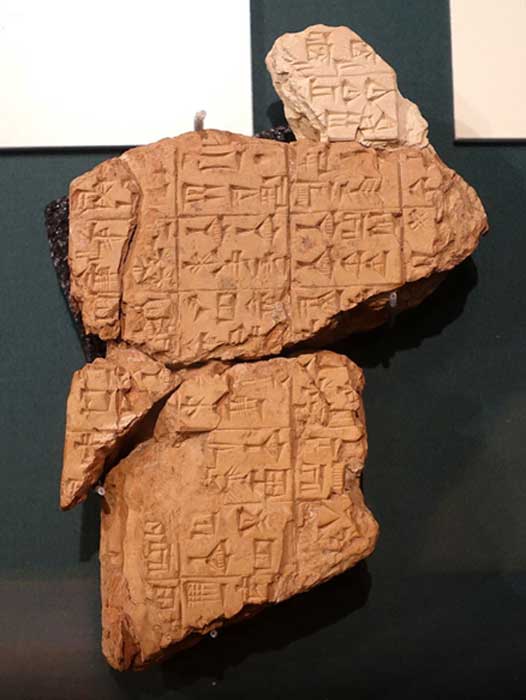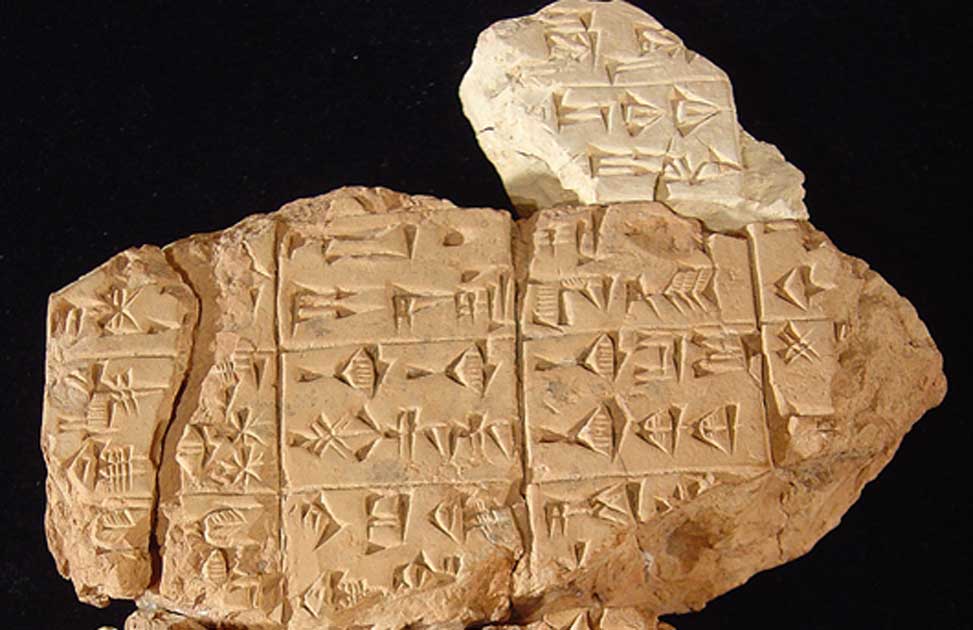Instructions of Shuruppak: 4,600 Years Ago, A Sumerian King Instructed His Son on How to Behave
The Instructions of Shuruppak are a set of 4,600-year-old Sumerian proverbs given by a king to his son, which essentially set out how he should behave. The ancient inscriptions were engraved in cuneiform script on clay tablets, and today they are among the oldest surviving literary texts in the world. A number of researchers have compared the Instructions of Shuruppak to the Ten Commandments and some of the proverbs in the Bible.
Giving Fatherly Advice
The Instructions of Shuruppak are attributed to the ruler of Shuruppak, the last king of Sumer to have reigned before the time of the Great Flood. The father of this king was Ubara-Tutu, whose name is recorded in most copies of the Sumerian King List, and is reputed to have lived for 18,500 years before Mesopotamia was struck by the Great Flood. In the Instructions of Shuruppak, the king is portrayed as giving advice to his son, Ziusudra (known in Akkadian as Utnapishtin):
“My son, I would instruct you,
Take my instructions,
Ziusudra, I would utter a word to you,
Give heed to it,
Do not neglect my instruction,
Do not transgress the word I uttered,
The father’s instructions, the precious,
Carry out diligently.”
- The Kesh Temple Hymn: 5,600-Year-Old Sumerian Hymn Praises Enlil, Ruler of Gods
- A Unique Form of Ancient Communication: The Whistling Island of La Gomera
- The 4,000-Year-Old Sumerian Love Poem and the Sacred Ritual of Marriage
Ziusudra is perhaps best known for being a character in the Epic of Gilgamesh. The name of this king means ‘found long life’, and, according to the records, he reigned as both king and priest for 36000 years. In one recension of the Sumerian King List, Ziusudra, instead of Shuruppak, is recorded as being the last king before the flood.

An image showing fragments of the Instructions of Shuruppak (dated to c. 2600 BC — c. 2500 BC). (CCO)
One version of the Instructions of Shuruppak begins with the words “In those days, in those far remote days, in those nights, in those faraway nights, in those years, in those far remote years,” an indication that what follows occurred in the primeval past, during a time when “the wise one who knew how to speak in elaborate words lived in the Land”. The text continues with the various counsels that Shuruppak gave to his son, Ziusudra. These pieces of advice cover a diverse range of topics.
- Was Bolivia-Peru the Sunset Land of the Sumerians?
- The Eagle Huntress: Ancient Traditions, and Evidence for Women as Eagle Hunters – Part I
- 4,000-Year-Old Ancient Babylonian Tablet is Oldest Customer Service Complaint Ever Discovered

It has been suggested that the figure on the left is Ziusudra. (solvo /CC BY ND 2.0)
Thou shalt not steal, thou shalt not commit adultery
In the first of three parts, Shuruppak gives such advice as “You should not steal anything” and “You should not play around with a married young woman”. Whilst these instructions exhort the reader to lead a virtuous life, there is also a utilitarian aspect to them. After each counsel, the author of the text provides the reasoning behind his advice. Thus, the reason underlying the advice against stealing is that “A thief is a lion, but after he has been caught, he will be a slave.” whereas the consequence for committing adultery is that “the slander could be serious”.
In the second part, the negative form of such advice is used much less often, and when they are employed, is not accompanied by the reasoning. Thus, for instance, the author writes “You should not pass judgment when you drink beer.” and “You should not worry unduly about what leaves the house.” More often, the instructions are given in the positive form. For example, “The artistic mouth recites words; the harsh mouth brings litigation documents; the sweet mouth gathers sweet herbs.” and “At harvest time, at the most priceless time, collect like a slave girl, eat like a queen; my son, to collect like a slave girl, to eat like a queen, this is how it should be.”
In the third part, both negative and positive forms are given in roughly the same proportion. The former includes such advice as “You should not buy a prostitute: she is a mouth that bites.” and “You should not speak arrogantly to your mother; that causes hatred for you, whilst the latter includes such instructions as “Fate is a wet bank; it can make one slip.” and “The elder brother is indeed like a father; the elder sister is indeed like a mother. Listen therefore to your elder brother, and you should be obedient to your elder sister as if she were your mother.”
Top image: Fragments of the Instructions of Shuruppak (dated to c. 2600 BC — c. 2500 BC). (CCO)
By Wu Mingren
References
Anon., The Instructions of Shuruppag [Online]
The Electronic Text Corpus of Sumerian Literature, Faculty of Oriental Studies, University of Oxford (trans.), 2002. The Instructions of Shuruppag. Available at: http://etcsl.orinst.ox.ac.uk/section5/tr561.htm
Beaulieu, P.-A., 2007. The Social and Intellectual Setting of Babylonian Wisdom Literature. In: R. J. Clifford, ed. Wisdom Literature in Mesopotamia and Israel. Atlanta: Society of Biblical Literature, pp. 3-20.
Kinnes, T., 2016. Wisdom of Babylon: The Instructions of Shuruppak to Ziusudra. [Online]
Available at: http://oaks.nvg.org/wisdom-babylon.html
Kramer, S. N., 1967. Reflections on the Mesopotamian Flood. [Online]
Available at: https://www.penn.museum/sites/expedition/reflections-on-the-mesopotamian-flood/
The Oriental Institute, The University of Chicago , 2010. Instructions of Shuruppak. [Online]
Available at: http://teachmiddleeast.lib.uchicago.edu/historical-perspectives/writing-and-literature/before-islam/image-resource-bank/image-03.html
The Schoyen Collection, 2016. Instructions of Shuruppak. [Online]
Available at: http://www.schoyencollection.com/literature-collection/sumerian-literature-collection/shuruppak-ms-2788

















